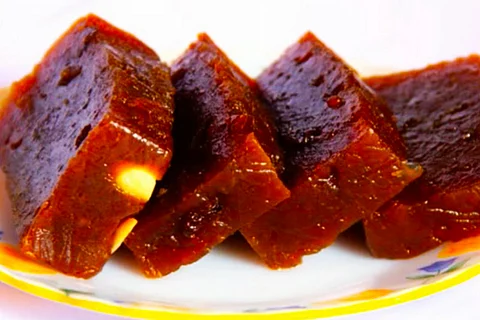

There is no dearth of desserts in God’s own country. The culinary evolution of Kerala is quite interesting and is very different from that of the other Southern states because of the confluence of cultures and their respective cooking styles and preferences. The state has an abundance of local produce and is among the greenest states in the country. And of course, almost every delicacy, from dessert to fish curry, tips its hat respectfully to the humble coconut.
The king of Kerala’s sweet delicacies is the Ada Pradhaman. There is no feast complete without the dish. Pradhaman is Kerala's version of payasam/kheer. Rice is soaked, ground, patted on to plantain leaves and cooked in boiling hot water. And this ada is scraped, cut coarsely and dropped into a broth of coconut milk and jaggery. So, traditionally made ada pradhaman has a myriad of well balanced and complementing flavours: rice, jaggery, banana, coconut and ghee.

Image courtesy: Maria's menu; Ada pradhaman
There are many other kinds of traditional Kerala payasams too, like the cherupayyaru (green gram) payasam or the nendram pazham payasam.
The versatile jackfruit or 'chakka' in Malayalam, is a summer treat in South India. While the neighbouring states savour the sweet fruit during summer alone, Kerala preserves jackfruit throughout the year in the form of Chakka Varatti and makes an array of desserts with the preserve. Chakka pradhaman is kheer made with chakka varatti and of course, coconut milk.
Rohini Varun is a software engineer from Kochi who loves everything on her Onam Sadhya plantain leaf.
"Well ripened jackfruit and jaggery (250 gm of dark jaggery for 1kg of fruit) is cooked to a mash in a traditional uruli (bowl). And the mash is emptied into an aluminium vessel that has loads of hot, hot ghee. The mixture splutters and lands on your skin causing boils. But our love for varatti trumps everything else. So, we wear gloves, cover our faces and stir until the mash reaches halwa consistency. A well done chakka varatti passes the clean knife test. You can cut through it with a knife and the knife has no sticky remnants’, says Rohini.
Image courtesy: Dhanya Padmanabhan; Chakka varatti
While purists swear by the uruli, the new age generation uses the pressure cooker to cook the varatti.
Dhanya, a Chennai based school teacher hails from Palakkad. Every year, her mother Latha Padmanabhan who lives in her hometown, makes a huge batch of chakka varatti for her kids and sends them to Bengaluru and Chennai.
Dhanya says, "Chakkai varatti, when cooked and stored carefully, stays well preserved until the next season of jackfruit arrives."

Image courtesy: YouTube screenshots; Kozhikode halwa
Kerala also has a wide range of halwas in multiple hues - Kozhikode is famous for the sweet made with different fruits and nuts! From banana to pineapple to mixed fruit, the bright colours are mesmerising.
In addition to chakka varatti, Dhanya and Latha love making unniyappam and acchappam. These, along with pazham pori are sweet snacks that accompany tea-time in Malayali households.
Pazham pori is sweet and ripe plantain that’s dipped in batter and deep fried. It’s the sweet cousin of bajji and pakoda. An anytime snack, it doubles as a sugar fix when you crave for an indulgent dessert.
Unnakaya is very similar to pazham pori. It’s mashed banana that is mixed with eggs, nuts, sugar, cardamom and is then deep fried.
Northern Kerala celebrates adukku pathiri which is very similar to the western idea of pies. And like western pies, they can be stuffed with sweet or savoury fillings. Adukku pathiri was traditional made with rice flour although it’s increasingly being made with maida these days. The sweet filling is made with beaten eggs, assorted nuts and raisins.
Baked dishes are rare among traditional Indian preparations. However, the Europeans who arrived at the Malabar coast and took home Indian spices left behind their baking legacy in Kerala. Malayali Christian families have their own age-old recipes for cakes, cookies and Christmas goodies.

Image courtesy: Maria's menu; Vattayappam